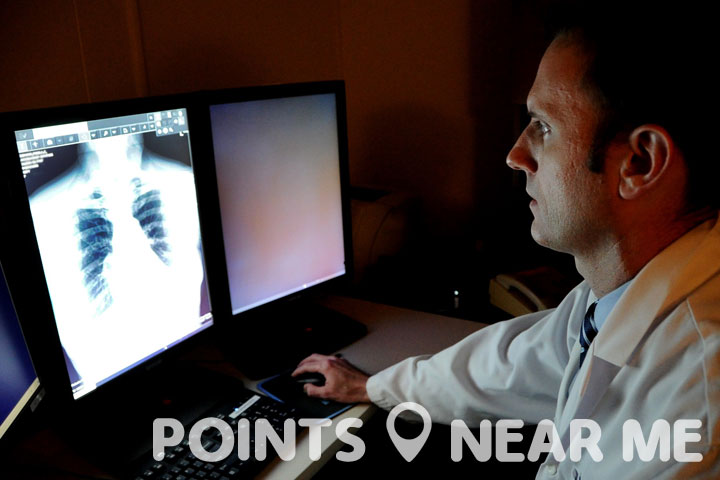Radiologist Near Me
Whether you’ve broken a bone or need an ultrasound- a radiologist is a medical specialist who is devoted to creating images denoting the inside of the human body. In order to take a peek underneath, radiologists use a variety of sources, including x-rays, ultrasound, magnetic resonance, and nuclear scans. Sometimes, a radiologist makes all the difference in pinpointing a condition and helping your doctor to create the best treatment plan for you.
Are you looking for a radiologist in your area? Simply browse radiologist near me on the map below and find a list of qualified radiologists in your local area. Need a bit more information on the field of radiology? Have no fear! Read on for facts, trivia, and tips on finding the best radiologist for you.
Radiologist Near Me – Find it on the Map
Radiologist Near Me – Radiologist Trivia
What is a diagnostic radiologist?
There are a few different types of radiologists that you’ll encounter while searching radiologist near me. By far, the most common is a diagnostic radiologist. Diagnostic radiologists are tasked with utilizing a variety of imaging procedures to look inside of the body and assess or diagnose a patient’s overall condition. While a radiologist will not create a treatment plan, they do play in important role by acting as a specialist consultant to the doctor who sent you for testing. A radiologist will choose the proper exam and direct radiology technologists who will perform those exams and help to pinpoint the exact cause of your symptoms. After imaging has been done, they will interpret and report on the images, recommending treatment or additional tests. A diagnostic radiologist will often specialize in one of these radiology subspecialties:
Mammograms
Cardiovascular radiology
Chest radiology
Emergency radiology
Gastrointestinal radiology
Genitourinary radiology
Head and neck radiology
Musculoskeletal radiology
Neuroradiology (brain and nervous system; head, neck and spine)
Pediatric radiology
The type of imaging you will need largely depends upon your symptoms, condition, and overall health. Not every type of imaging is right for every patient.

Whether it’s an x-ray or an MRI, a radiologist can help get to the root of your condition with ease.
What is an interventional radiologist?
Unlike a diagnostic radiologist an interventional radiologist seeks to diagnose and treat patients using image-guided techniques such as an X-ray or an MRI. For example, if you’ve been having issues such as blurry vision, migraine headaches, or vertigo, an interventional radiologist may perform an MRI to help view any potential issues of the brain. They carefully guide their instruments through very tiny incisions in the body, which will help doctors to reach the source of a medical problem and deliver targeted treatments. Conditions such as stroke, cancer, heart disease, and uterine fibroids can all be treated by an interventional radiologist. Pain and recovery time is far less than if a patient were to undergo traditional surgical methods. As you search radiologist near me, consult with your referring physician to find out what type of radiologist may be best for your unique situation.
Radiologist Near Me – Radiologist Facts
Is an ultrasound right for you?
By far, an ultrasound is one of the most common radiology procedures performed worldwide on a daily basis. While many people only associate ultrasounds with pregnancy it is a widely used imaging technique that can help to identify and diagnose a variety of conditions. Consider this as you search radiologist near me. Ultrasonography is an advanced form of medical imaging that actually uses ultrasound waves to visualize the soft tissue structures in the body. Thanks to technological advancements, an ultrasound can provide a 3D reconstruction of human tissue in real time. This can give radiologists and doctors a better idea of what’s going on. One of the best aspects of an ultrasound is that they do not expose the patient to radiation, which makes them far safer than other forms of imaging. This is why pregnant women can safely get an ultrasound but may not be able to get an x-ray. In addition to examining babies in utero, ultrasounds are also used to examine a variety of vascular diseases, internal bleeding, stenosis, and the arteries. Ultrasounds can also be implemented for certain issues of the GI tract.
What’s the difference between an MRI and a CT scan?
Two common methods used in radiology include an MRI and a CT scan, but what is the difference between these two types if imaging? Consider this as you search radiology near me. CT scans use X-rays along with advanced computing algorithms to help create very accurate images of the body. CT Scanning is generally the test of choice in diagnosing very urgent or emergent conditions, such as a clot in the arteries or lungs, kidney stones, cerebral hemorrhage, appendicitis, and even diverticulitis. Scanning times are faster than ever and because of improved resolution, these tests are frequently used in radiology. In contrast, an MRI uses very strong magnetic fields to align atomic nuclei in the body, then uses radio signals to disturb the rotation of these nuclei, then observes the radio frequency signal as the nuclei return back to their original positions. This process is what helps to create an MRI image. MRIs are very complicated, but they do create the most sophisticated soft tissue contrasts of all imaging techniques used. MRIs are frequently used to examine the brain, heart, organs, and musculoskeletal system. In searching radiologist near me, you’re on the right path to fully understanding what type of testing you’ll require.












